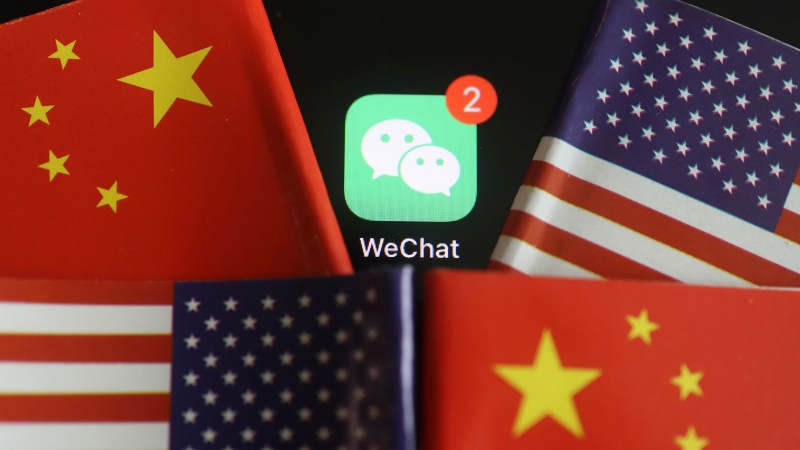
President Trump last night issued executive orders that would effectively ban TikTok and WeChat, two Chinese apps, from the United States in 45 days. It remains to be seen how stringently such a ban would be enforced (and what it would actually entail), and given TikTok’s ongoing acquisition talks with Microsoft, it’s even possible that the popular video-sharing app survives without triggering the measure.
Much of the discussion over the past several weeks has focused on TikTok, which has drawn scrutiny for data-privacy practices that critics say are vulnerable to requests from the Chinese government. But careful observers of the Trump administration’s messaging have noted that WeChat, too, has been in the sights of White House officials. There probably should have been more coverage about the messaging app before last night’s move: Whereas TikTok is a popular social-media app and perhaps a fad, WeChat is a rare platform that crosses over the Great Firewall, connecting families, businesses, and all manner of daily interactions. It has staying power as a fixture of daily life in China and in Chinese communities abroad.
That’s also why going after WeChat will be inherently messier than banning TikTok. Any discussion of such a measure needs to acknowledge two important facts: WeChat is arguably a more malignant vector of the Chinese Communist Party’s influence in the world than is TikTok. At the same time, a ban has the potential to create difficulties for members of the Chinese diaspora abroad with family still in the country — and these are exactly the people that U.S. policy should empower. The administration can easily argue that WeChat is a worthy target, but the question of what exactly to do about it is more complicated.
The WeChat executive order lays out an argument focusing on the app’s data collection, which “threatens to allow the Chinese Communist Party access to Americans’ personal and proprietary information” and allows the CCP “a mechanism for keeping tabs on Chinese citizens who may be enjoying the benefits of a free society for the first time in their lives.” That explanation is a good start. Over the past few months, there has also been some useful reporting and analysis of the app’s CCP connections that bolsters the administration’s case.
The Australian had an interesting story last week about the way that Chinese Communist Party propagandists use the China-based app to maintain influence with members of the Chinese diaspora abroad, calling it “Mr Xi’s most powerful weapon.” From the article:
Highly sophisticated monitoring functions make it a cornerstone of the Chinese government’s social-credit system that, according to China’s State Council, will “allow the trustworthy to roam everywhere under heaven while making it hard for the discredited to take a single step”.
Together with the broadcast of state-sanctioned TV programs into thousands of Chinese-Australian homes, WeChat provides a unfiltered stream of CCP propaganda to the global diaspora.
This corroborates a finding by the Australian Strategic Policy Institute in June in a report about the United Front Work Department, a foreign influence arm of the CCP:
Several overseas Chinese-language media outlets are owned or controlled by the UFWD through China News Service, including Qiaobao (侨报) in the US and Australia’s Pacific Media Group (大洋传 媒集团). At least 26 WeChat accounts run by nine Chinese media outlets are in fact registered to a subsidiary of China News Service. The accounts operate in all Five Eyes countries, the European Union, Russia, Japan and Brazil. They include accounts registered to Qiaobao and Pacific Media Group, indicating that they may all belong to companies supervised by the UFWD. Many of the accounts appear to have tens of thousands if not hundreds of thousands of followers.
There’s also clear evidence showing that WeChat closely surveils images and files shared by users outside of China to train its censorship algorithms within the country. Here’s an analysis from the University of Toronto from earlier this year:
WeChat users outside of China may think that WeChat’s political censorship and surveillance system does not affect them. However, in new research we show that files and images shared by WeChat users with accounts outside of China are subject to political surveillance, and this content is used to train and build up the censorship system that WeChat uses to censor China-registered users. Our technical methods can only tell us if files and images shared on WeChat are under surveillance. We don’t know yet if chat message text is under similar surveillance. In the meantime, users should be aware that this is a possibility.
The administration would help its case by being more forthcoming about the precise nature of WeChat’s involvement in disinformation and surveillance in the United States, expanding on the argument in the executive order. In the coming days, it will need to forcefully argue that the security threat posed by WeChat — surveillance, disinformation, or both — overrides the important link that the app gives many people to China.


